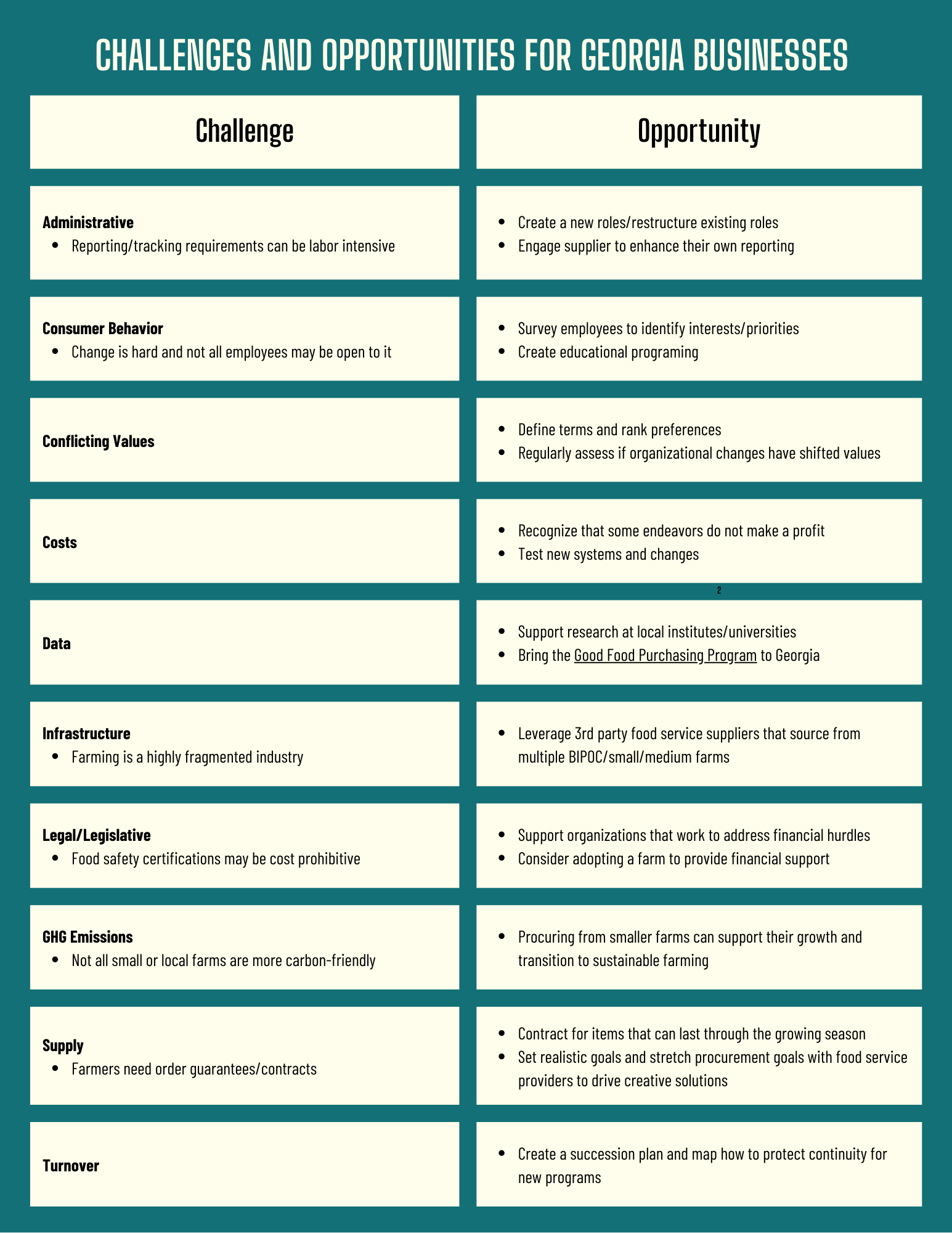Values-Based Food Procurement in Georgia
By Felicia Lamothe (MBA ‘23)
What is values-based food procurement?
Many businesses prefer the term values-based food procurement over local food procurement because it aligns purchasing decisions with a broader range of strategic priorities beyond just geographic proximity. While local procurement focuses on sourcing from nearby suppliers to support regional economies, values-based procurement integrates key business goals such as sustainability, supply chain resilience, ethical labor practices, environmental stewardship, and diversity in sourcing. This approach allows companies to meet ESG targets, enhance brand reputation, and mitigate risks across their supply chains, all while supporting food systems that reflect their corporate values—even when suppliers are not strictly local.
The Problem
Food and Agriculture make up over 11.5% Georgia’s total greenhouse gas emissions. To cut carbon substantially, we need to grow food in ways that benefit the land, sequester carbon, foster plant-forward diets, reduce food waste, and increase composting.
The Business Case for Action
Businesses have the potential to drive reduction in greenhouse gas emissions, improve employee and community health, redirect dollars back into local economies, meet the growing demand for local/sustainable food, and combat historic inequity in the treatment of small/medium (primarily BIPOC) farmers. The following table highlights estimates of benefits and examples under these priorities:
Potential Costs
Value food-purchases (organic, fair-trade): With increasing demand for “environmentally friendly” foods, procurement decisions may lead to higher unit costs.
Labor: Depending on the organization's current team and future goals, additional roles may be required, or existing roles altered, to operationalize and support the shift to values-based food procurement.
IT Systems: Current systems may not allow for the desired tracking of metrics and therefore require upgrading or transitioning to new programs.
Suppliers: Adopting a values-based approach to procurement may require new efforts from suppliers. Resistance from existing suppliers, the need for enhanced or new food services, and the need to seek out new suppliers could be associated with higher costs.
Business Case Spotlights
Spotlight 1: Emory - History of Emory’s Sustainable Food Initiative (2018)
Spotlight 2: General Mills – 2023 Global Responsibility Report
Spotlight 3: Pie Ranch + Google – An Innovative CSA Model (2014)
Key Research Areas
What is the greenhouse gas impact of a regenerative farm versus a traditional farm of the same size in the state of Georgia?
What are the conditions that make local food purchases more environmentally friendly than out-of-state purchases?
What are the estimated costs across the supply chain for small/mid-size farms that switch from traditional to regenerative farming?
What are the long-term impacts of offering local, healthier food in corporate cafeterias on turnover, employee job satisfaction, and employee healthcare costs?
Challenges and Opportunities for Georgia Businesses
Additional Resources
Emory’s Sustainable Food Initiative (Feb 2018)
Opportunities to Reduce Food Waste in the 2023 Farm Bill (Apr 2022)
2023 FM Top 50 Companies (Apr 2023)
Boston Food Justice Ordinance – requires large scale food providers to donate leftover food
https://civileats.com/2023/03/02/forging-pathways-to-land-access-for-bipoc-farmers-in-georgia/
The Environmental Impacts of U.S. Food Waste (EPA, Nov 2021)
Biggest sources of excess food waste across America (News Daily, May 2022)
https://www.businessnewsdaily.com/2963-healthy-diet-impacts-productivity.html
https://blog.drawdownga.org/how-does-food-waste-contribute-to-greenhouse-gas-emissions
Impact of Transportation on Carbon Dioxide Emissions from Locally vs. Non-locally Sourced Food (Emerging Science Journal, July 2019)
Drawdown Georgia GHG Emission Tracker
Why Farm-to-Institution Sourcing is the Sleeping Giant of Local Food (Aug 2016)
Relevant Policies and Bills
American Rescue Plan Section 1005
COMPOST Act (H.R. 651 and S. 179)
Emergency Relief for Farmers of Color Act of 2021 (S.278)
Family Farm Ad Valorem Tax Break - 1997 Georgia H.B. 1350 (Enacted April 20, 1998)
The Food Date Labeling Act of 2021 (S. 3324 and H.R. 6167)
The Food Donation Improvement Act (S. 3281 and H.R. 6251)
The bill enhances the coverage of the Bill Emerson Good Samaritan Food Donation Act (Emerson Act), to expand liability protection for food donation and reduce wasted food nationwide.
Justice for Black Farmers Act of 2021 (S.300)
Zero Food Waste Act (H.R. 652 and S. 177)
Document References
1 https://www.usda.gov/sites/default/files/documents/USDA-GHG-Inventory-1990-2018.pdf
2 The Comprehensive Business Case for Sustainability (Oct 2016)
3 PwC February 2023 Global Consumer Insights Pulse Survey (Feb 2023)
4 Georgia Local Food Procurement Guide for Child Nutrition Programs (Sep 2013)
5 The Local Food Impact: What if Georgians Ate Georgia Produce? (May 2010)
6 Can Regenerative Farming Replace Traditional Farming? (Jan 2022)
7 Bearing Fruit: Farm to School Program Evaluation Resources and Recommendations (2008)
8 A Business Case for Social Justice (Jan 2021)
A For another approach see: A Guide to Developing a Sustainable Food Purchasing Policy
Thank you to the following individuals who collectively provided insights, shared resources, and helped drive the direction of this paper: Dr. Bradford Baker, Dr. Valerie Thomas, James Hauser, Emily Hennessee, Mindy Goldstein, Jennifer Chirico, Grayson Stuart, Kashi Sehgal, David Eady, Michael Oxman, and Allison Bridges.



